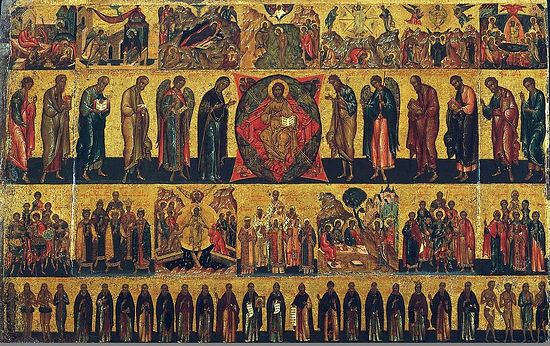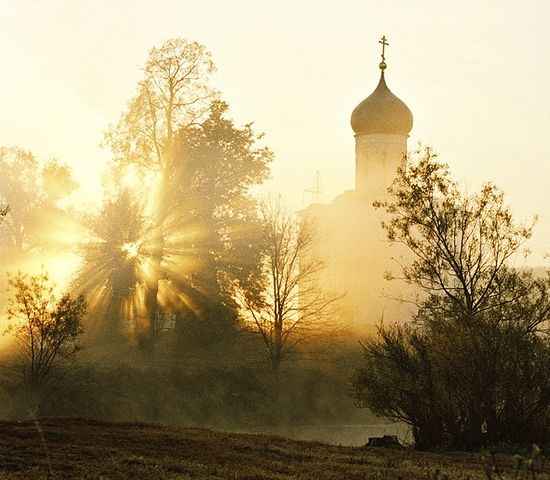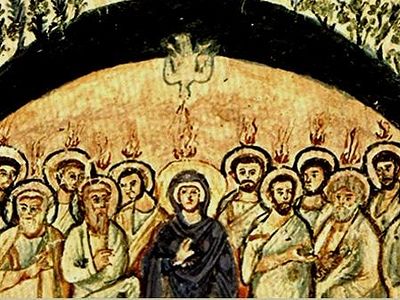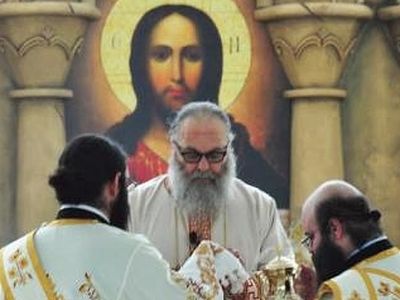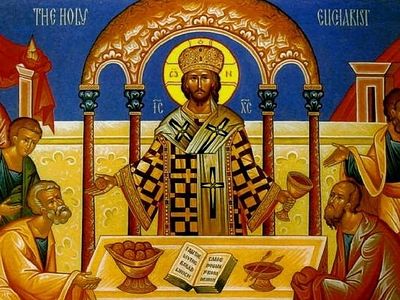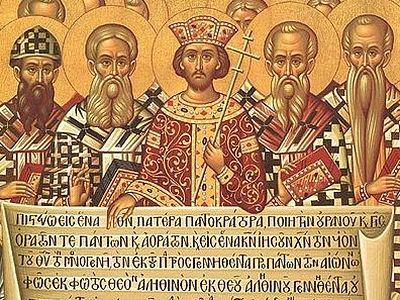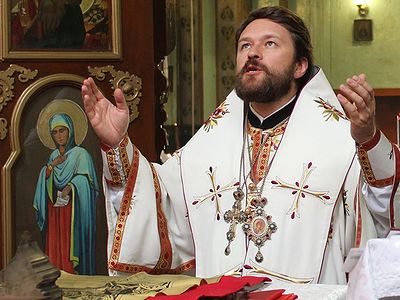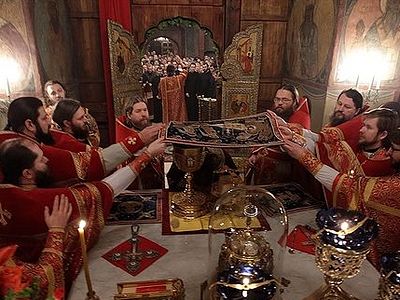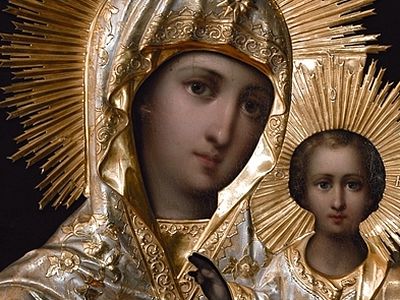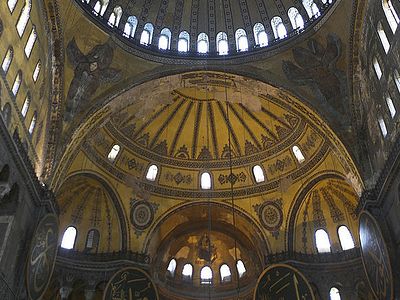The Church’s invitation to holiness, communion in self-sacrifice and the life-long process of Deification through love of God and love of mankind.
“Seek God daily. But seek Him in your heart, not outside it. And when you find Him, stand with fear and trembling, like the Cherubim and Seraphim, for your heart has become a throne of God.” – St. Nectarius of Aegina (1846-1920).
“Be perfect even as your heavenly Father is perfect.” – St. Matthew 5:48.
In this journey toward divinization, the Church’s central role cannot be overemphasized. Because so much of Orthodox spirituality has to do with worshiping in the “inner Tradition” of the Liturgy, the Church’s services and the prayers taken from it really are direct aids in the evolution toward theosis. At the same time, the process of deification requires a Christian to lead a life of Christian action. It is here where Orthodoxy is so deeply inspiring to me: the Church cleaves to its “inner Tradition”, which holds fast and remains unchanged, emphasizing a positive invitation rather than a negative command, over and over again, to listen and act based on the words of Our Lord recorded in Luke 9:23:
Whoever wants to be my disciple must deny themselves and take up their cross daily and follow me.
What is this daily cross in modern times? Where does it appear? I believe it is to be found in a unique place in each person’s soul, oftentimes with different crosses appearing over the course of our lifetimes. These crosses constitute different sacrifices, different struggles for different people. For some, the cross may be poverty, physical or spiritual, and its accompanying fear, depression, and tendency toward despondency, and the challenge is to seek God with an open, loving heart with all one’s strength. For others, the cross may be material wealth, which can often become a great spiritual poverty, and the challenge is to come to God with a humble heart with all one’s strength and love the poor. For others still, the cross might be healing (or in some cases, ending) a difficult or harmful relationship, dealing with estranged family members, enduring a personal tragedy, or any other deeply painful circumstances which unnerve our inmost being and cut to the core of who we are. It is these later struggles which can often impair our relationship with God. For a smaller group within the Orthodox Church, there is the challenge to embrace asceticism and monastic life as a monk or nun or a religious vocation as a priest or deacon. For all of these crosses, the challenge is always to try, through our prayerful relationship with God, to remain open to the grace of the Holy Spirit, “the Paraclete, Comforter, the Spirit of Truth. . .”
To follow in the path of Jesus and live the Christian life is certainly not easy, especially in a contemporary society that constantly challenges core elements of the faith. His Beatitude Metropolitan Jonah has said that what we do in church on Sunday counts for only five percent of actually being Orthodox. Actually living the faith requires that one’s beliefs, which one professes in church, be put into meaningful and corresponding action outside in the world. His Beatitude observed in his April 10, 2009 podcast interview on Ancient Faith Radio with Fr. Andrew Jarmus that this impetus to right action corresponds inexorably to a selfless love of one’s fellow man:
In order to be Christians we need to take up the daily cross of self denial, which really consists of being able to put our own opinions and ideas into perspective, and to look and see what is the greater good of the other. How can I serve the other, how can I love the other? How can I deny myself so that I can live in communion and love with the other, so that my ego no longer becomes the main criterion of my decisions, my own action, but rather, first and foremost, the will of God.
The Orthodox believe that in every sacrifice or trial we undertake in pious and heartfelt rendering to God, when we do these things we are ever conscious that we are doing them in remembrance of Christ’s redeeming salvation and His promise to all of eternal life, that ever-present sign of God’s enduring love for His creation. Thus, the “belief” in Orthodoxy and the “action” living the Faith requires are not separate parts of a compartmentalized, cordoned faith, but mutually symbiotic, reinforcing elements that both serve to strengthen, enrich, and enliven one’s faith. This thinking is one of the strongest attractions the Orthodox way holds for me.
This denial of self might seem especially difficult to college students. It is hard in many ways to be a religiously observant college student today; many devout Christian, Jewish, and Muslim students will tell you that living out their faith involves not only positive loving service and action in the spirit of God, but answering many of their secular colleagues’ often hostile questions: “Why are you praying?” “Why are you doing that?” or, more often, “Why don’t you do that?” Many religious students will find that living their faith requires them to abstain from much of what their less observant (or non-religious) friends consider to be “integral parts” of the contemporary college experience: heavy drinking, recreational drug use, the “hookup” culture of casual or anonymous sex, etc.
Indulgence in all these things—sex, drugs, and alcohol, as they are so succinctly put—are attractive to many college students. A part of why I am writing this is to be a witness, in what small way that I can, to share with whoever is reading this that there is another path you can take, another path open to you outside of what everybody seems to be doing. Many students feel a heavy pressure to “just do it” whether the ‘it’ in question is a marijuana joint, binge drinking, hard drugs, or becoming physically involved with someone they literally just met. The last “it” in particular has caused many of my friends, both male and female students, to feel used, hurt, and confused. These instances of misuse of your or someone else’s body are events in time that have happened in every generation and every culture throughout history. What is so hard for a lot of young students today is to avoid the line of thinking that insistently proclaims ‘everyone is doing it.’ This peer pressure is a powerful argument for many students struggling with poor self-image or with low confidence entering college, and especially those facing different emotional issues or family circumstances.
When Saint Paul wrote to the Thessalonians in the first decades of Christianity’s very presence in the world, he offered them a clarion call to holiness—not absolute perfection, for saints are not God, but a path toward holiness, toward perfection. His words then are as relevant, and as actionable, today as they were when he first recorded them: This is the will of God: that you be saints. (1 Thessalonians 4:5.)
The apostles frequently referred to the first Christians as ‘saints’, but what did this term mean to them? One such saint is not the same person as the Virgin Mary, who was so without corruption or sin that God became incarnate through her, by her acceptance and free choice to bear the Theanthropos, the God-Man Jesus Christ. A saint, like all of us, starts off “fallen” or separated from the perfect form of living to which we are all called. What makes the saints of the Church so remarkable is their ability to open themselves, truly open themselves in all aspects of their life, to the working of the Holy Spirit.
St. Irenaeus of Lyons reaffirms St. Paul’s urging, reminding us that, “The glory of God is the perfection of the creature.”
Since man is the summit of His creation, made by Him in His image, and granted the promise of eternal life through God the Son, think of this challenge to perfection as an ongoing process rather than an intrinsic end. Salvation is not some thing that just happens, but an ever-evolving, ever-revealing transformation in which we are called to attain the highest and truest form of personhood by living our faith in Jesus Christ. Father Anthony M. Coniaris, a prolific Orthodox writer and priest emeritus of the Greek Orthodox Archdiocese of America reminds us that, “Salvation is not static but dynamic. It is not a completed state, a state of having arrived, but a constant state of moving toward, becoming like Christ, toward receiving the fullness of God’s light.”
Thus, salvation from the Orthodox perspective can best be described as a constant journey toward Christ, a road which meets with many bumps and challenges along the way. God is the engineer who laid the foundation for this road, Who planted that seed in all of our souls, and the Church is the engineer who shapes, designs and helps maintain the road, and its saints the best travelers.
Many look at the lives of the saints and get overwhelmed or discouraged, thinking “they were perfect!” and feel unworthy of emulating their path, as though they could not possibly move from where they are at present to even remotely near a saint’s level of holiness. At other times it might seem as though such a sanctified life is not possible to live in this day and age, with young people feeling so much pressure to “just do it.” This can be very discouraging.
Yet part of the beauty of living an authentic Christian life is not being sinless, for we all sin, even the saints, but striving for imitation of Christ, for imitation of godly living and of wholesome love for the other and of care for one’s soul. Michelangelo, that genius among geniuses who painted the Sistine Chapel ceiling laying on his back at the command of a pope, hands down a gauntlet, not for us to seek to imitate his genius or his specific work, for that can never be equaled or surpassed. Rather, he challenges us to challenge ourselves:
“The greatest danger for most of us is not that our aim is too high and we miss it, but that it is too low and we reach it.”
Orthodox prayer encourages and facilitates the development of an individual sense of consciousness of one’s sins and failings, but not for the purpose of dwelling negatively on one’s failings, but focusing positively on one’s free choices to live “in the light”. One of the most important prayers in personal devotion is the “Jesus Prayer”: “Lord Jesus Christ, Son of God, have mercy upon me, a sinner.” This prayer has particular importance in Orthodox monastic life, specifically in the eremitic hesychasm pursued by many monks on Mount Athos, the monastic center that can be regarded as a spiritual capital of Orthodoxy. In the Jesus Prayer we are reminded of the importance of St. Paul’s words when he urges us to “not be conformed to this world, but continually be transformed by the renewing of your minds so that you may be able to determine what God’s will is—what is proper, pleasing, and perfect.” (Romans 12:2). Responding to the call to such “pleasing and perfect” life is a deeply spiritual undertaking, very much connected to the process of theosis, which Bishop Kallistos reminds us is “a social work” originating in the heart as well as the mind, and necessitating the will of both.
Not something to be complainingly undertaken as a burdensome obligation, this call to holiness is one of the crowning jewels of the Orthodox faith. Orthodoxy is an invitation to return to the fullness of God’s love, to restore the intended closeness of the relationship between God and man. As St. Basil the Great writes, “The design of our God and Savior in regard to mankind is a calling back from the Fall and a return to a familiar friendship with God from the alienation brought on by disobedience. This is the reason for Christ’s sojourning in the flesh, for the model of His Gospel actions, the suffering, the Cross, the tomb, the Resurrection. That man, who is being saved through his imitation of Christ, might receive that old adoption as son.”
This view of salvation is profoundly relationship-based, intimately connecting each person’s sanctification to how Christ-like she or he is, how meek, humble, and loving she or he is toward all people. When in the Litany of Fervent Supplication in the Divine Liturgy the Church prays for “patriarchs, priests, fathers, mothers, sisters, brothers,” one sees the centrality of human relationships to the Orthodox perspective. We are being saved together; all of us a part of our church community living in communion with each other and with the living Body of Christ around the world. When during the Anaphora the priest offers the Eucharist, “for those who have fallen asleep in the faith; ancestors, fathers, mothers, patriarchs, prophets, evangelists, martyrs, ascetics, and every righteous spirit made perfect in flesh”, one sees that this communion, and the prayerful and loving relationships such communion entails, extends beyond the grave to include those “fallen asleep” in Christ, who we believe worship invisibly with us before the altar.
When we strive to become like God, ultimately one with Him as we contemplate His glory and the joys of Christ’s saving triumph over Death, we begin to understand the key to the ideal Christian life, which is salvation itself. Writing in the year 270, St. Basil the Great compared salvation to ascending a ladder, with one end touching the ground of the earth and the other rising to the heavens: What is necessary for “those being introduced to the virtuous life,” the Christian path to salvation, is that they “should put their feet on the first steps, and from there mount ever to the next, until at last they have ascended by degrees to such heights as are attainable by human nature.”
St. Basil’s expression of salvation is the antithesis of the evangelical concept rooted in “five-point Calvinism” that an elect person can be saved by an emotionally overpowering “born again” experience in which he or she is absolutely “saved” the moment they accept Jesus as Lord and Savior. This doctrine, taught as the last point, “Perseverance of the Saints” in classic “T.U.L.I.P.” Calvinist thought, ignores and denies each person’s God-given free will to choose to sin or fall away. Faith in Christ as the Savior and obedience to the teachings of the Church are fundamentally important to the Orthodox view of salvation, but what faith is not is an unshakable certainty in a static moment of salvation which one receives in an instance. Faith is not surety in a gift of salvation from God granted to some (but not all) in a set moment in time from which the elect can never depart or fall short, but an invitation to a process of gradual transformation as one strives to dedicate one’s life to Christ through constant renewal by the Holy Spirit.
By describing salvation as a slow ascent of ladder steps which one takes in degrees, St. Basil draws attention to the crucial role that one’s spiritual father or mother plays in the life of every Orthodox believer. By meeting regularly with one’s spiritual parents, especially a priest who can administer confession, one intimately learns of ways to recover and return again to the path of ascent, the gradual transformation in faith. As Bishop Kallistos once answered an evangelical Christian he met on a train who pointedly asked him, “Are you saved?”, “I trust that by God’s grace I am being saved!”
For the Orthodox, the central axiom of our life in Christ is making Him the core of our existence. In his remarks at the assembly of the Anglican Church in North America in June 2009, Metropolitan Jonah insisted that Christians must change their mindset, their approach to spirituality, so that we acknowledge that:
“It is only Jesus Christ that matters. And that faith is the core of our identity, not only our relationship with God but with one another. It’s a unity that totally transcends our particularity. But in and through that unity, in and through that communion, with Christ, and with one another, by the Holy Spirit, we find our true and authentic personhood. It’s only by actualizing that relationship with God in Christ by the Holy Spirit with one another that we truly become persons in relation to one another, in that communion of love, and that love which is not a human emotion, but that love which is the very grace of God that flows forth from our hearts by the presence of the Holy Spirit, embracing our neighbor, embracing our enemies, embracing all of our name, everyone. And it’s only by this unity, this transcendence of all that would keep us imprisoned in our heads, imprisoned in our emotions, imprisoned in the particularities of our own egocentric little worlds, it’s only by the transcendence of all of that, to live according to this new identity in Christ, in absolute union and communion of love with one another, that we actualize the Church..”
His Beatitude’s speech is nothing less than a rallying cry for Christians everywhere to engage with the central questions of Christianity (“Do I love God with all my heart? Do I love my spouse, my neighbor, the poor woman, or my enemy, as if he or she were Christ?”) on a much deeper level than what society today asks of us or what many Christian denominations instill or expect. Communion in Orthodoxy is certainly communion of belief, sharing the same faith, partaking of the Eucharist together, but it must also be a communion of joined souls. The Church calls us to a communion of people coming together in full cooperation with the Holy Spirit in love, fellowship, and true transcendence of self-centeredness and self-importance.
This is not a liberal idea or a conservative idea. This is the very process of theosis, the very core of our divinization. Without this core aspect, without people opening themselves, by the power of the Holy Spirit, to “that love which is the very grace of God that flows forth from our hearts,” as Metropolitan Jonah puts it, the Church remains divided in a dichotomy between the Place, that is, the location for worship and spiritual transcendence, and the Idea, the unrealized community of hearts and souls living and acting together in Christ. It is the joining of Place and Idea in the lives of the Orthodox faithful which offers a full, living, dynamic synergy between that timeless, beautiful transcendence found in Orthodox worship, and the transcendence found in what Metropolitan Jonah calls actualizing the Church—living the Gospel in heart, body, and spirit. By this actualization, which is impossible without our cooperation with the Holy Spirit, we are divinized, we become as St. Peter exhorts us, “partakers of the divine nature.”
Importantly, since theosis “according to the likeness of the Trinity involves a common life, it is only within the fellowship of the universal Church that this common life of coinherence can be properly realized.” This fellowship should be seen as inclusive rather than exclusive, since its greatest expression in the life of the Church is in the communion of the faithful in the Eucharist. Orthodoxy maintains that since, “Church and sacraments are the means appointed by God whereby we may acquire the sanctifying Spirit and be transformed into the divine likeness” to which we aspire, participation in the mystery of the Holy Eucharist should be a joy for one’s heart and soul.

